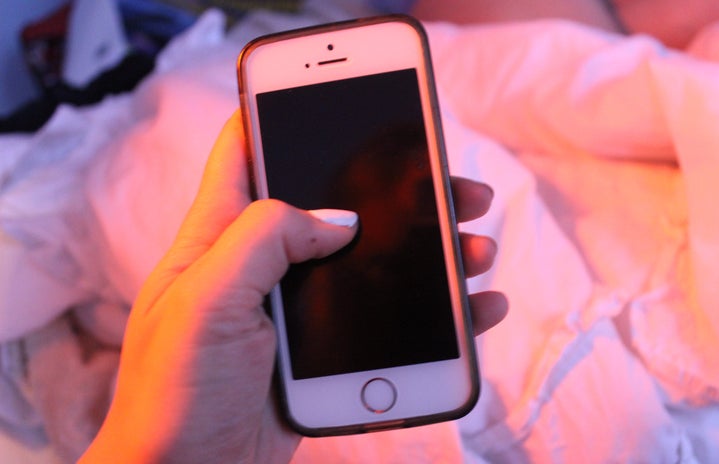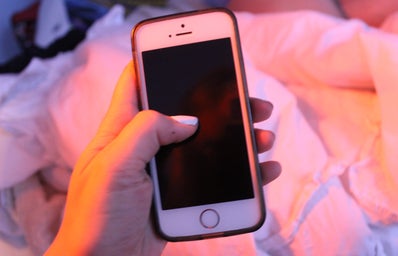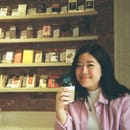Quinn Fitzgerald and Sara Dickhaus de Zárraga are ready to redefine personal safety. The two co-founders have just launched their new personal safety app, Flare. Where other kinds of perosnal safety tools focus on absolute emergencies, Flare focuses on giving people a discreet early escape from any uncomfortable situation. The app connects to a bracelet that looks like any piece of nice jewelry but there are buttons on the side that signal to the app you need some help. The app can either send out a pre-recorded call to make it sound like you’re needed elsewhere or send a text to a group chat of friends to let them know yoru location.
This new innovative way of giving anyone feeling at risk new agency has been a passion project for Quinn and Sara. On top of this device, they’ve also launched The Aura, a platform for voices around modern safety, relationships, experience of survivors, and more. Last week, ahead of their busy launch day, the two of them took the time to sit down with Her Campus and tell us what the journey to this point has been like.
I was reading on the Aura about how it took a lot of workshopping the original idea for Flare with data and talking to non-profit organizations. Can you talk a little about where your original idea faltered and what were the biggest learning curves for you two throughout the process?
Quinn: Yeah, happy to – Sara and I started Flare because of our own stories but also because our stories are not at all unique. We knew that the safety industry was incredibly antiquated in the way they thought about safety. When I say safety, I think people tend to think – “oh! You’re in an emergency, you need to call the police!” And, while that does happen, the vast majority of situations are when you’re with somebody you know, and you get a bad vibe, but you don’t have certainty about what their intensions are. You don’t want to cause a scene, and you don’t want to overreact. And so, we’re obsessed with solving that problem.
We’re obsessed with figuring out how people actually experience safety and not buying into the stereotype or the assumption that the industry played into for a very long time. And we didn’t get it right from the beginning. To be honest, we started out by knowing that the stereotype existed and knowing that people needed a really discreet way of getting out of a situation without letting people around them know. But we also thought, in the early days, that we needed things that helped in emergencies too, like a loud alarm. And we learned that, part of the reasons stereotypes and assumptions have succeeded so well is that people didn’t test their own assumptions. And we wanted to test our assumptions, so we went out and talked to literally thousands of people. We partnered with local non-profits and companies that are actively working with survivors and trying to prevent assault. We learned a lot from that process. We did focus groups, beta tests, surveys, one-on-one interviews, and through that process we developed an expertise in how people actually experience safety versus stereotypes of it. And when we started not just listening and acting on that, it’s become the foundation of our company since. You know, Flare was not just built by us, it was built by everyone together. Bringing our stories into a collective mass so that we could make something that was actually useful.
You two occupy such a rare and important space as female leaders in a male-dominated industry like tech. Can you talk about what it was like to get to do the hiring and have that power in a male dominated industry?
Sara: I would say that it’s pretty important to both of us personally – female leadership and female representation in our past experience as well as in Flare. We want to make sure there’s female leadership in tech. And it is challenging because so much of the industry is not well represented by women. A lot of the technology and the solutions that exist in the world right now, are not being designed with a female perspective or for women’s unique needs. That was really important to us in designing the project now. It’s a thread that’s been threading through our lives, our past careers, and all the work that we do. We think the best way to serve female-centric problems are with the insights of women. Our own perspectives are an important part of that solution, but it’s also what Quinn was talking about as well – making sure that everybody’s voices are heard so that we come to a great solution here.
A big part of providing a solution that gives women agency is about giving them control – to know what’s going on in their lives, to know what they need, because they know best. It’s an important feat in the product and our company.
Quinn: We often get asked, “what about men?” We don’t want people to think we’re a company only for women. We strongly believe that safety is an issue that affects everybody and hope to be able to provide more solutions in the future. We’ve had people of all sorts of identities wear our bracelets.
Just a quick follow up – personal safety and the identities of people Flare aims to help aren’t usually given the big platforms and voices in your industry. Given all that, was it hard at all while looking for investors to find people that understood what you two were doing?
Sara: It was. I think part of investing is having a connection with the problem and with the solution that a startup is addressing, and that was a challenge for us. But it was also a way for us to know who is going to be great partners for us and who wasn’t. There were people we went and talked to and pitched the business to that really didn’t think women’s safety was a big enough problem in the world to warrant a venture capitalist scale investment. And Quinn and I were just floored by that. Women’s safety is a huge problem. 1 in 5 women experience rape or attempted rape in their life, in college that’s 1 in 4 women and that’s only what gets reported. And I think a part of that is some of the people sitting across the table from us while we were fundraising, hadn’t experienced this stuff. They didn’t have a true connection with the problem. And that’s part of the problem in not having more female investors, and female tech leaders, in an industry where women need solutions to problems that often go unrecognized or ignored.
It’s really cool that you also have the Aura where you have written content on mental health, how to help survivors in our own lives, and just a plethora of content to help bolster a larger brand of personal safety. What was it like developing this aspect and are there any other areas (in content creation or tech) that you see Flare expanding into?
Quinn: Such a great question, thank you for asking it. You know when Sara and I decided to start Flare, it was not about ‘how do we create a specific device for this kind of specific situation.’ It was about ‘how do we change the conversation around personal safety?’ For so long, safety has been about fear and vulnerability. For us, it’s about celebrating the positive side of going out there, living your full life, going after your goals, and having agency. We wanted that conversation to exist because when you actually sit back and think about safety means to you as an individual – no matter who you are, where you are in life, or what you believe – how could you not relate to it? Who doesn’t care? Who doesn’t want the control to put themselves out there and live a full life?
For us, it’s about your own wellness and how to take care of yourself. And so, when we think about how we work in the business, that is our goal. We want to fight for a world where you don’t have to make compromises for your safety. For us, the Aura is a community dedicated to redefining how people think about personal safety, a space for personal expression, for candid conversation, storytelling, and being real. It’s where we amplify different voices around safety, sex, relationships, culture, student life, and wellness.
Sara: Basically, what is it like to be a young person moving through society? You know you were asking about the larger context of our business, and um and we really see Flare as a vehicle to lend a voice thanks to our research and conversations with thousands of people, we get to lend that voice to broader conversation that’s happening about women’s empowerment, place in the world, sexual assault. We think we have so many important stories to share based our research. Part of that is breaking down stereotypes that exist about safety. Like how Quinn was saying before where, people tend to think of personal safety being about someone sneaking up behind you in a dark alley and grabbing you, and that being the of 100% emergencies.
People don’t realize a majority of assault happens with someone you know, and those are delicate situation. People have to worry about how to be successful – socially, professionally, or academically – and so, they want the ability to de-escalate, not escalate by using something like pepper spray. They want that ability to de-escalate the moment that they feel like something’s wrong, not feel like they’re trapped and have to wait to see if this becomes an emergency that warrants an escalation. What we’re really doing is giving people’s tools to at earlier. And part of the education we’re pursuing is part of that, telling the world that young women know what they need. When you’re in an uncomfortable situation or a bad situation, only you know how to read that situation and what is right and what is not right – tapping into those energies that you feel in your body or that other people are giving off around you and how choosing how to act however you want to act. It’s about putting power back in young women’s hands, instead of feeling like it’s out of their control and something is being thrust upon them by someone else.
Quinn: We cannot emphasize enough how much this has been a community driven project. It’s not just built by us, it was built by so many people standing up and saying, ‘this is my story and I’m going to talk about it because people can learn from it.’
Through your social media and larger brand, you make a careful and thoughtful effort to market towards young women, specifically young women in college right now. Can you talk about why this is such an important demographic to you and also are there any other kinds of people that Flare will reach and help?
Quinn: We want Flare to reach anyone who identifies with the issues that we face, the issue that a lot of people face around personal safety. We plan on adding a lot of feature to our mobile application that will make our audience bigger. But right now, our focus is really on people who are in college because the risks against personal safety are so much higher in college than in other times in people’s lives. And it’s a time when you should be exploring, you should be trying new things and feeling comfortable doing that. That’s what Flare is all about.
Sara: A lot of the product design is driven by women’s experience in the world because it’s also driven by my and Quinn’s experience in the world. It’s what inspired us to get into this business, but it’s not solely for women. Women experience this problem at a higher rate compared to other groups of people, so this is our first step. Everyone has to start somewhere, and we want to start with the group that’s experiencing the problem the most. So, women’s voices have been heard a lot in our product design but that doesn’t mean it’s only for women. It’s just where we’re starting but Flare is for people of all different ages, genders, races, all different kinds of identities who need safety for one reason or another, we want to provide solutions for all of them. We’re focusing on providing solutions for one group really successfully first, so we’re then able to expand even more to address all kinds of people’s identities.
Quinn: You know, sometimes we talk to people and they’re like, ‘ugh man, I really wish this product didn’t have to exist in the world.’ And we’re like, ‘yes, we could not agree more!’ We’ll succeed when the world doesn’t need a company like Flare. We’re going to try to put ourselves out of business!
It’s really cool that Flare, both in the bracelets and larger brand design, has a real aesthetic to it. I feel like the most other companies will do is release something like, pepper spray in a pink bottle. What was it like building the aesthetic of Flare and having that creative control?
Sara: We really started from scratch, and we re-thinking how people would experience this product, instead of just thinking in the box of ‘wearables.’ We always wanted it to be beautiful first, so that it would be really discreet. You could wear it without anyone knowing it’s a safety device and you could be excited about wearing it because it’s beautiful. It feels immediately accessible to you and it doesn’t feel like tech, it fits in your jewelry box and you don’t have to charge it. It’s easily adoptable into your life. We didn’t want women to have one more burden they had to do for their safety. That’s not what Flare is about. It’s not about blaming women or telling them they have to take care of their safety. We just believe that safety is really about a community driven approach. There are so many organizations that are working on this problem, fighting to change a lot and providing services and education to survivors. One thing that women need in addition to these amazing actions is better safety devices. We see our product as one of many things to help with this problem, not the only solution. There are times you’ll want to have pepper spray or something else with you, depending on what you’re doing and where you are. But we wanted our design to be fun and exciting and easy to use to add to that whole arsenal of tools people can have at their disposal.
Quinn: What we set out to do was rebrand safety as a whole – it’s a whole new look, a whole new different feel, it’s a whole new different way of talking about it. Because frankly, we were tired of seeing triangles with exclamation points in them with the bright oranges and yellows and reds. It did not relate at all to us and it didn’t feel good! Safety should feel good, because it’s you taking an active choice for yourself. We built these different Auras – that’s the colors you see behind the brand – to represent how you feel in the moment. It’s about trusting your gut, feeling the signals and feeling comfortable acting on them. They serve as a representation of those hidden signals that exist and also represent the camouflage feeling that this safety product has in people’s lives.
Last question – do you have any advice for our college student readers right now about how to approach their personal safety and starting your own business?
Quinn: Oh yeah, I have one really big piece of advice: If you’re trying to start a business, you know your business better than anyone else and you have to trust your gut on that. Sometimes, that means getting advice and saying, ‘yes! I want to act on that advice and go ahead to explore it.’ And sometimes, that means getting advice and throwing it in your mental trash bin.
Sara: Listen to all the advice you get with an open heart and an open mind and talk to as many smart people as you can about what you’re building – that’s really the approach that Quinn and I took. But be able to gut check that and say, this person sitting across from me, does their opinion weigh as heavily as mine? Do they know as much about this program? Have they talked to as many people? Have they tested out this idea? Have they run surveys and focus groups, have they collected data on this problem? Or are they just trying to be helpful, which usually comes from a good place, but aren’t particularly informed? That’s a gut check call every entrepreneur has to make for themselves that’s particularly difficult for young women in the world.


